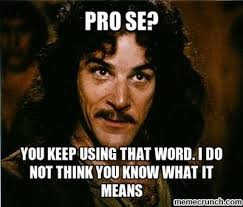Are you a law student accused of a crime? You could waive your right to legal representation and handle your case ‘Pro Se.’ This post unpacks the meaning and origin of this expression.
Meaning
The expression ‘Pro Se’ is a legal term. The word originates from the Latin term ‘Pro Se,’ meaning ‘on behalf of oneself’ or ‘for oneself.’ The term means you request the right to handle your defense yourself in a court of law.
The term can apply to civil and criminal cases, but it's more common in criminal court. Small claims court doesn’t require the plaintiff or defendant to have a lawyer present, so you could say this is ‘Pro Se’ representation.
Example Usage
“The judge asked me if I want to waive my right to legal counsel and stand trial Pro Se. I have no idea what that means.’
“I can’t afford a lawyer, and the public defender is a kid out of college. I think I can better represent myself in court, Pro Se.”
“I am warning you, don’t take on your legal defense yourself. It might seem like a good idea to go Pro Se, but you’ll regret it, I promise.”
“I’m handling my case myself, Pro Se. I don’t trust the public defender and think I’ll take my chances without legal representation.”


Origin
The expression 'Pro Se' is legalese originating from the late 1700s. In the case 'Faretta v. California,' the Supreme Court of the United States ruled:
Section 35 of the Judiciary Act of 1789, 1 Stat. 73, 92, enacted by the First Congress and signed by President Washington, states the following.
"In all the courts of the United States, the parties may plead and manage their own causes personally or by the assistance of counsel."
"In the federal courts, the right of self-representation has been protected by statute since the beginnings of our Nation."
The Court's opinion is that criminal defendants have the right to refuse counsel, choosing to represent themselves after waiving their right to representation. It's important to note that 'Pro Se' representation is not an absolute right.
The Court has the authority to determine if an individual is capable of representing themselves. The Court may examine the individual's mental capacity and lucidity when making that decision.
Phrases Similar to Pro Se
- Waive your rights to legal counsel.
Phrases Opposite to Pro Se
- Lawyer up.
What is the Correct Saying?
- Pro se.
Ways People May Say Pro Se Incorrectly
The phrase ‘Pro Se’ doesn’t have any meaning outside the legal industry. Using it to describe voiding legal representation in civil matters, interrogations, or interviews with the police is incorrect.
Acceptable Ways to Phrase Pro Se
You can use the phrase ‘Pro Se’ in legal matters where you want to tell the court that you wish to represent yourself and waive the right to legal counsel. You can use this legal strategy if you can’t afford an attorney and feel the public defender isn’t competent enough to handle your case.
You can also use ‘Pro Se’ to describe legal proceedings in small claims court, where lawyers are not allowed. Typically, the phrase refers to criminal cases, not civil matters. So, you’ll use it in scenarios where the judge asks you if you’re waiving your right to legal counsel, choosing to represent yourself in court.